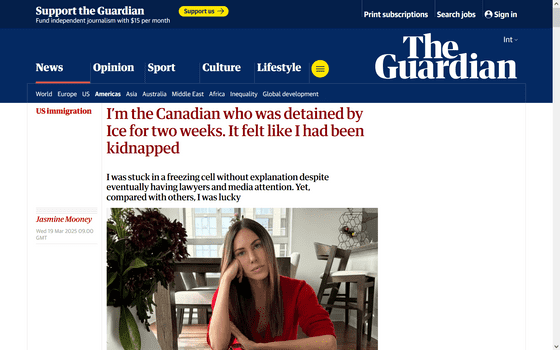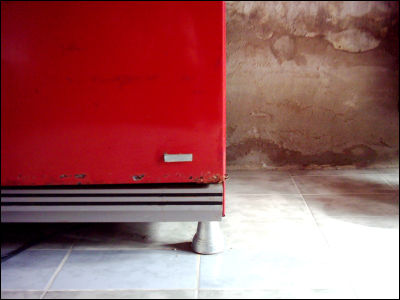A true story of being detained for two weeks after traveling from Canada to the US

Jasmine Mooney, a Canadian, wrote about her experience of being suddenly sent to a detention center after entering the United States on a work visa. She points out that behind the sudden detention is a 'business' run by a private organization that receives funding from the government based on the number of people it can hold.
I'm the Canadian who was detained by Ice for two weeks. It felt like I had been kidnapped | US immigration | The Guardian

Mooney is a Canadian-born actor and businessman who obtained a work visa and traveled to the United States after receiving an opportunity to launch an American health food brand.
However, during his stay, he was confronted by Border Patrol agents and, without an opportunity to speak to a lawyer, was transferred to a detention center run by the U.S. Immigration and Customs Enforcement (ICE) agency.

Mooney has traveled between Canada and the US several times in the past, but his visa was previously revoked for some reason (he has not disclosed the reason).
The background to this incident is that when Mooney arrived in the United States, he was questioned by an immigration inspector about the cancellation of his visa and asked why he went to the border in San Diego, near Mexico, to reapply for a visa. This was because his personal lawyer's office was nearby. The inspector told Mooney that his visa had not been properly processed and that he needed to reapply, so he was transferred to the San Diego immigration office.
At the San Diego Immigration Bureau, Mooney was told that he would need to apply for a visa through the consulate, so he gave up and started looking for a return flight. However, a security guard appeared in front of Mooney, took his luggage, and began questioning him. Mooney was then placed in a cell and told, without being told what was happening, that he should prepare to be detained for several months at worst.
Mooney spoke to people who had been held in the cell, many of whom had overstayed their visas, some for up to 10 months. All of them were detained without warning, and expressed frustration with the seemingly endless detention measures without explanation, Mooney said. Mooney added, 'The real problem is we don't know how long it will take to get out of the detention system, and I'm wondering why there are no clear answers, deadlines, or ways to proceed.'
However, overstaying your visa is definitely illegal, and we can assume that Mooney got into trouble due to some legal issues. In fact, on the social site Hacker News, one comment reads, 'I have a Chinese friend who is going through the immigration process, and he says, 'I don't understand why people are making such a fuss about it being unfair when they broke the rules.' Other countries have problems with overstaying their visas, so why are there

Mooney was transferred to several detention centres, but the conditions were extremely poor and he struggled to keep from panicking.
After a while, Mooney contacted a friend, who then consulted a reporter, and Mooney's case was widely covered by the media. Perhaps because the story had become so big, Mooney was released, and was able to breathe fresh air for the first time in about two weeks.
'I had a Canadian passport, a lawyer, resources, media attention, friends, family and even politicians defending me, and yet I was detained for nearly two weeks. Imagine what it must be like for others,' Mooney said.

Mooney later began alleging that the detention he faced had business-related reasons.
The facilities where ICE detains people are privately owned and funded by the government based on the number of people they hold, and some of these facilities are lobbying for stricter immigration policies. For example, CoreCivic , which runs prisons and detention centers in the United States, receives more than $560 million a year in contracts with ICE, while GEO Group , which runs correctional facilities, receives more than $763 million a year in subsidies.
'The more detainees, the more money they can make,' Mooney said. 'It's no wonder these companies have no incentive to release detainees quickly. So it explains why I was detained for two weeks. This is not just my story. It's the story of thousands, tens of thousands of people who remain imprisoned.'
Related Posts:
in Posted by log1p_kr







